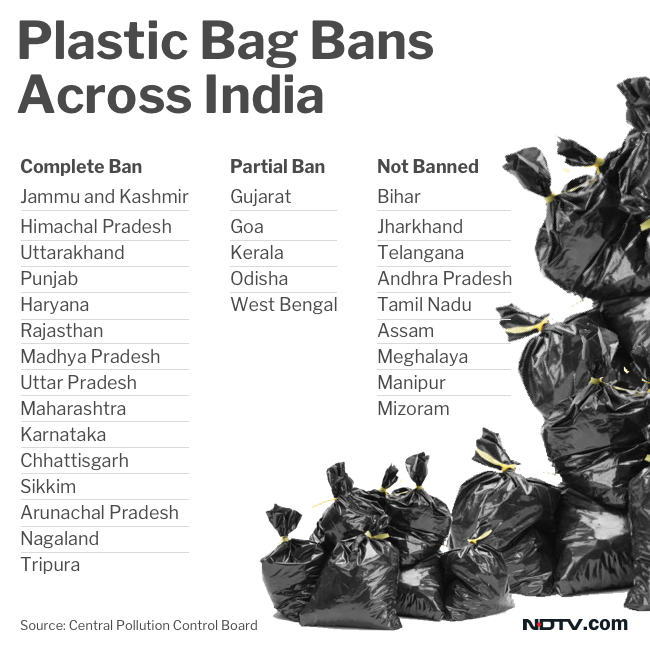Highlights
- 15 states have completely banned plastic bags, 9 states have partial ban
- Easy and cheap availability of plastic bags principal reason for their use
- Sikkim only successful in curbing plastic bag usage positively
New Delhi: In a few hours from now, India will host the 45th World Environment Day 2018 celebrations, with the theme of ‘Beat Plastic Pollution’. Reverberating UN Environment’s call to ditch plastic and increase awareness on the adverse effects of plastic pollution, India will look to send a strong message to the world on steps being taken to deal with plastic pollution. The battle against plastic waste in India is embroiled in a cruel irony, as despite 25 Indian states and union territories imposing some sort of ban on plastic, over 25,000 tonnes of plastic waste are generated in India daily, of which more than half (nearly 16,500 tonnes) is made up of plastic bags. Similar to the country’s geography and culture, the effectiveness of banning plastics in India has varied from region to region.
The Federation of Indian Chambers of Commerce and Industry (FICCI) estimates that in 2016-17 plastic industry in India was worth nearly $7 billion (Rs 48,000 crore). Despite the partial and complete bans on plastic across many states, the industry has grown over the years, as consumption of plastic has also risen. Not just plastic bags, but plastic used in packaging has also increased over the years, as the demand for packaged goods has risen. The Central Pollution Control Board states that in 1996, plastic consumption in India was 61,000 tonnes, which rose to 3 lakh in 2000 and by 193 percent in next 10 years to be 178 lakh in 2017.
Environmentalists fear that the huge economic value of the plastic industry has become a deterrent in effective imposition of the ban nationwide.
The plastic ban in India is honestly a failure till now. Many states have imposed complete or partial ban, but barring Sikkim, no other state has been successful in implementing it. The reason why the ban remains unsuccessfully imposed is because the plastic industry is too big to stop production, sale and manufacture all of a sudden, said Rajiv Trivedi, Committee Chairman, Indian Plastics Institute, an independent think tank tracking the sector.
Plastic Ban In India So Far
A 2015 report by the NGO Toxics Link noted that 15 states in India have placed a complete ban on plastic bags and 5 states have placed partial bans on these. 9 states in India, including the likes of Bihar, Tamil Nadu and Andhra Pradesh have no ban on plastic bags. The Central Pollution Control Board (CPCB) in its annual report of 2015-16 noted that the difference in plastic waste generation between states that have banned plastic bags and the ones that haven’t was minimal, and in some cases, non-existent.
Karnataka, which has banned plastic bags since March 2016 generated 1,29,000 tonnes of plastic waste in 2016, compared to the similarly size state (in terms of population) of Andhra Pradesh which generated 1,28,480 tonnes of plastic waste in 2016, without any bans.
The ban placed on plastic bags by states has not translated into the kind of success it was hoped for, because plastic is identified for its easy to use ability, cheap manufacturing and sales cost and easy availability. It has become a part of the Indian consumer, and hence replacing it or lessening its use is highly difficult, said Divya Sinha, Senior Lead Scientist, CPCB.
Also Read: Why I Pushed For The Ban On Single-Use Disposable Plastic
Plastic Ban: The Differences
The nature of bans on plastic across India has hurt the process of imposing bans, feels environmentalist Ashok Rawat, head of the NGO Conserve. The lack of universality in banning plastic bags has hurt the overall imposition and impact that would have been there, had bans been implemented across the country. In a Himachal Pradesh, plastic bags less than 70 microns are banned, whereas in West Bengal, bags less than 50 microns are banned. The nature of ban on plastic bags is not equally distributed across India, and that may have had a negative impact on its implementation.
Even among state pollution control boards, confusion reigns supreme with the nature of bans placed in their respective states. Ashish Tiwari, member secretary at Uttar Pradesh Pollution Control Board (UPPCB) said that plastics with thickness less than 50 microns are banned in the state, whereas CPCB lists UP as a state with complete ban on plastics. In Chandigarh, a ban on plastic bags has been in place since 2008, but municipal officials have found it nearly impossible to impose the ban, despite fining shopkeepers, as shopkeepers keep buying plastic bags from neighbouring states.
Plastic Ban: Urban Rural Divide
Urban India fares worse than its rural counterpart in generating plastic waste. Of India’s annual waste generation of 62 million tonnes, 5 million is plastic waste generated by India’s cities. The national capital Delhi generates over 689 tonnes of plastic waste in a day, followed by Chennai at 429.30 tonnes and Mumbai at 408 tonnes. Among states, Maharashtra tops the list of plastic waste producers, with 4.6 lakh (4,69,098) tonnes per year, followed by Gujarat at 2.6 lakh (2,69,000) and Tamil Nadu at 1.5 lakh (1,50,323) tonnes.

Maharashtra tops the list of India’s largest plastic waste producing state, followed by Gujarat and Tamil Nadu
Plastic Ban Enforcement: A Pan India Difficulty
At a glance, the number of states in India enforcing partial or complete ban on plastic bags does not look too bad. The ground reality however, is starkly different with over 25,000 tonnes of plastic waste generated daily from all over the country.
Complete or partial, bans on plastic bags across India’s states have largely failed to provide desired results. Sikkim, which banned the use of not only plastic bags but plastic made items such as cutlery is the only success story that has emerged out of a series of statewide plastic bans. Apart from Sikkim, the ban on plastic has not seen much success, especially in the bigger states like Uttar Pradesh, Madhya Pradesh, Rajasthan. In the national capital Delhi, a variety of bans on plastic bags have been placed, the most recent one being a National Green Tribunal (NGT) order in August 2017 which completely prohibits the use of non-biodegradable plastic and ordered a penalty of Rs 5,000 on violators. Plastic bags though, continue to be readily available across the capital.
The Economics of Plastic Bags:
For consumers of plastic bags, which include shopkeepers and buyers, enforcing a ban on plastics is expensive and makes it difficult for them to sustain their profits. A bag of non-biodegradable plastics with thickness of 20 to 30 microns and containing 50 to 70 pieces of polythene bags comes at a cost of Rs 20. Biodegradable plastics are costlier, coming for Rs 80 to 100 for a pack of 30 to 40 plastic bags, and are hence not preferred by small shopkeepers. Small shopkeepers prefer cheaper plastic bags, as it does not interfere with their costs and hinder their profit margins. Consumers too do not mind such plastic bags, as long as it is free of cost.
Sushmita Sengupta of Centre for Science and Environment says that plastic bags are not treated as dangerous items and hence, their open availability has overshadowed the ban.
Continued supply of plastic bags is a problem in implementing a complete ban on plastics. There are approximately 22,000 plastic manufacturing units in India, producing 5.72 million tonnes of plastic each year. Ban on sale or usage of plastic bags is difficult when plastic itself continues to be produced at such large scale.
Nearly 6 million tonnes of plastic was produced in India last year. States like Jammu and Kashmir, Himachal Pradesh, Uttar Pradesh have banned the sale of plastic bags, but not manufacture. As long as production is there, a complete ban can never become reality, because produced plastic bags will inevitably find their way into the market, says Ms Sinha.
“After the 2012 Supreme Court reprimand on the widespread usage of plastic bags, a study was conducted in 2015 to check the status of bans across states. The level of implementation across 8 states was found to be poor or severely poor. Only Sikkim, Arunachal Pradesh, Nagaland and Tripura did moderately well in enforcing the ban,” adds Ms Sinha.
Lack of economically viable alternatives is also a huge deterrent in India. Bags made out of jute or cloth cost significantly more at Rs 8 to 10 per piece, which are not affordable for small and medium sized shopkeepers. Plastic bags which are free of cost and accompany goods has become part of our culture, and using alternatives to such bags is expensive. Unless alternatives to plastic bags are produced and procured at cheaper rates, usage of plastic bags will not be curbed.
Logistics of Plastic Ban
The challenges of implementation across India vary, with most common one being lack of a single authority being able to enforce the ban across states. In the states of Rajasthan, Uttar Pradesh, Madhya Pradesh and few others, the state pollution control boards are responsible for enforcing the ban. In states like Uttarakhand, Delhi or Chhattisgarh, the onus of enforcing the ban falls on the local municipal corporations, which often cite problems like lack of manpower or budget to strictly enforce a plastic ban.
We often raid shops, confiscate the plastic and impose the required fine on the shopkeeper. But a few days later, the same shop begins reusing plastic bags. We cannot continuously monitor a shop to check if it is using plastic bags or not. We do not have that kind of manpower, said a South Delhi Municipal Corporation officer.
Insufficient policing in enforcing plastic bans is also a key reason for unsuccessful implementation of plastic bags. Most state pollution control boards do not have separate teams to seize plastics, and are dependent on local municipal authorities, which are understaffed and overworked to have a dedicated crew to implement and monitor plastic ban. South Delhi Municipal Corporation Commissioner Puneet Goel says that despite seizing over 800 kgs of plastic in 2017, plastics continue to be available in the southern part of the national capital.
How Sikkim Got Plastic Ban Right
Sikkim’s success in curbing plastic bag sale and usage is an example states can learn from. The advantage of Sikkim’s geographical size notwithstanding, the state since 2005 has conducted a comprehensive campaign to make people aware about the ills of plastic, how it chokes the soil and water bodies and causes severe environmental pollution. The success in curbing plastic bags enjoyed by Sikkim today was not achieved by just the imposition of random fines, but also by making people aware about hazards of plastic. Similar success stories have emerged out of Nainital and Jaipur, where shopkeepers have begun to use chargeable cloth bags instead of plastic ones.
Bans will not be successfully imposed if people are not made to understand why the product has been banned in the first place. Sikkim has done that successfully, and it is high time others follow suit. The ban should begin from manufacturing and if possible, turning such units into manufacturing of cheaper alternatives to plastic. The adverse effect of plastics should also be spoken about more frequently, so that people know how harmful they are,” said A Sudhakar, Member Secretary, CPCB.
Curbing the usage of plastic bags is one of the many steps required to be taken to deal with the national menace of plastic waste. It must not be forgotten that plastic bags aside, PET bottles and plastic wrappers also contribute towards the generation of plastic waste. Given the widespread manufacture, availability and usage of plastic bags, a gradual reduction could translate into less usage of other plastic products as well.
Also Read: World Environment Day 2018: Are Recyclable Plastics A Viable Option For India?





























